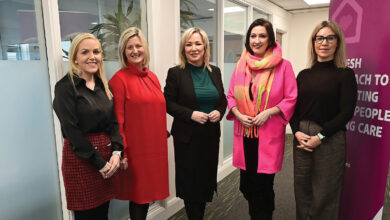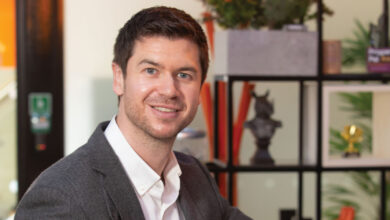Gerry Carroll MLA: Why we need the People’s Housing Bill

A staggering £38.6 million was spent on temporary accommodation in 2023/24. This housing system is creating a crisis for ordinary people, but it has also been a golden business opportunity for landlords and the companies receiving public money for provision of temporary accommodation, writes People Before Profit MLA Gerry Carroll.
Throwing huge sums of public money at private landlords and profiteering companies can never prevent homelessness. It is an absurd, firefighting approach to solving a deep-rooted problem that will only enrich the asset-owning class. The focus of efforts to tackle the housing crisis must be on expanding the supply of permanent social housing and helping people to sustain their existing tenancies.
These are the core aims of my own private member’s bill, the People’s Housing Bill.
Turning empty houses into homes
If rates of social housing construction continue their current trajectory, it will take over 50 years to tackle our social housing waiting list. It is abundantly clear that the Executive cannot or will not summon the necessary funding and political will to build its way out of the housing crisis.
A potential solution lies right before our eyes, on our residential streets, and in derelict corners of our towns and cities: empty properties.
There are at least 22,666 vacant domestic properties across the North. Making use of empty homes to tackle the housing crisis is common sense. In the context of inadequate homelessness and housing budgets, it will almost always be more cost-effective to bring a derelict property up to habitable standard, compared with building social housing from scratch.
Refurbished buildings also make much better use of embodied resources, like carbon and cost, compared with new builds. Most empty domestic properties are already connected to the existing wastewater infrastructure network.
Every house lying empty is a home denied to someone who needs it. 95 per cent of respondents to the People’s Housing Bill consultation agreed (11.8 per cent) or strongly agreed (83.2 per cent) that vacant properties should be used to help tackle social housing waiting lists.
Despite overwhelming public support for bringing empty homes back into use, this is not being pursued by the Executive. The Department for Communities published an Empty Homes Strategy and Action Plan, but this expired in 2018. An Empty Homes Unit was established within the Housing Executive in January 2014 but was gradually scaled back from 2016. No progress has been reported on the Strategy since 2021.
Cutting private rents
It is no coincidence that the scale of our housing crisis – as evidenced by steep rates of homelessness, the spiralling social housing waiting list, and unprecedented levels of spend on temporary accommodation – has grown in tandem with the rise of the private rented sector.
To whatever extent the North has had lower poverty rates compared with elsewhere in the UK and Ireland, this is largely attributable to our historically lower housing costs. This small reprieve has now been decisively shattered.
The North has consistently witnessed the highest rate of rent inflation in the UK since November 2017. The scale and speed of this inflation has escalated since Covid; it has not fallen below 9 per cent per year since August 2022, peaking at 10 per cent in March 2023.
Average rents across the North are £942 per month (£1,102 In Belfast). The poorest quarter of private renters in the North spend 45.4 per cent of their monthly incomes on the worst quality housing (suffering from poor insulation and conditions like damp and mould). As rents continue to rise while income stagnates – and benefits are cut – private tenants will be pushed further into poverty and destitution.
But when the mere suggestion of rent control is presented as a solution to this affordability crisis, many in the sector panic at the thought of landlords fleeing the market.
Between 41 per cent and 60 per cent of landlords have threatened to do, but why should we believe landlords will follow through on this threat in large numbers, when the actual evidence proves otherwise? In Scotland – which introduced a rent freeze in 2022 followed by a cap on rent increases for sitting tenants – the numbers of landlords and private rental properties have increased, despite rent regulation.
It is also worth noting that most landlords in the North cannot appeal to costlier mortgages to justify their opposition to rent control. A survey of 1,710 private landlords found that only 37 per cent depend on rental income to cover mortgage payments on any of their properties. Only 19 per cent financed their rental properties with a repayment mortgage.
If, despite the odds, landlords do flee the sector, they will not take the house with them. They will likely sell to another landlord, having no impact on supply or to a first-time buyer. Alternatively, the Housing Executive could step in to buy the properties and put them to use as social homes.
Rent control is not a socialist pipe dream. They existed in the UK for most of the 20th century, until Margaret Thatcher obliterated them in the late 1980s. In recent years, rent controls have been introduced in many European countries, as well as cities in the US. The dire lack of regulation makes the North (and Britain) an outlier, with no rent price control and an abundance of insecure, short-term tenancies.
As a socialist, I believe that no piece of legislation, however comprehensive and well drafted, can perfectly solve the housing crisis. This is because the crux of the problem is the commodification of housing. Capitalism forces people into worse and more expensive housing. Until the profit motive is removed from our housing system, tenants will always be exploited by those in power: asset-owning landlords and wealthy companies.
However, good legislation that strengthens and protects the rights of tenants can make a significant, meaningful difference in the everyday lives of ordinary people struggling to pay rent, living in homes riddled with damp and mould, waiting on social housing or experiencing homelessness. This is why I am fighting for these important reforms, and why I hope you will join that fight.





